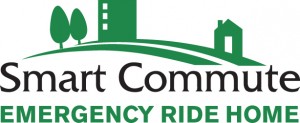Emergency Ride Home

Certain Smart Commute Markham, Richmond Hill workplaces are eligible for Emergency Ride Home (ERH) reimbursement
(please contact us to see if your workplace
qualifies). If you have an unforeseen emergency on any day you use a sustainable method to commute to work, you
can request reimbursement of up to $75 for your emergency transportation costs. Ensure you retain all emergency
transportation receipt(s).
Emergency Ride Home Terms and Conditions
- Any commuter at an eligible Smart Commute workplace can access ERH if they used a sustainable mode of
commuting on the day they require a ride home. Sustainable modes of commuting include transit, carpooling,
vanpooling, cycling, walking, or any other alternative to single-occupant vehicle travel. If you are unsure
your workplace is participating, please contact us at info@smartcommutemrh.ca
- Registration with the Smart Commute tool/app is required to participate in the ERH
program and prior to submitting a reimbursement claim.
- Commuters may use ERH for any distance, routing and stops they prefer, but will only be reimbursed to a
maximum of $75 per ride. Note: The Smart Commute Markham, Richmond Hill maximum reimbursement varies based
on the individual workplace’s service level agreement.
- Commuters may use ERH for unplanned reasons. Smart Commute reserves the right to track individual usage and
verify the reason for rides. A ride home will qualify for ERH coverage in the following situations:
- Personal or family illness, accident, injury or emergency situation.
- Unscheduled overtime, approved by a supervisor.
- Unplanned absence of a carpooling partner due to their having to leave early or
stay late unexpectedly.
- ERH does not cover a ride to work, except for the following situations:
- Bicycle accident or breakdown (e.g., flat tire).
- There are no limits on the number of rides commuters can claim per year, but Smart Commute reserves the
right to track individual usage and verify multiple rides for individual commuters within a single year.
- Situations where travel could have been arranged in advance do not qualify for ERH coverage. Other
situations that do not qualify for ERH include, but are not limited to:
- Pre-planned overtime known to commuters.
- Overtime performed without a supervisor request.
- Pre-planned medical or personal appointments.
- Pre-planned or known absence of a carpool partner.
- Business travel.
- Personal errands.
- Missed transit connections.
- Transit delays or cancellations.
- Weather-related emergencies.
- Natural disasters.
- Building closures.
- Power outages.
- ERH claims must be submitted no more than 2 months after the day of the ride and within the same calendar
year.
- There are no limits on the type of transportation commuters can choose for an emergency ride. Commuters may
use multiple methods during the ride home, such as ride-hailing (e.g. taxi, ride through app) followed by a
public transit trip. Personal mileage claims are not eligible for reimbursement; this includes trips by car
and bicycle.
- Commuters may submit claims through the Smart Commute tool/app, alternatively
email or via regular mail. A form is available upon request.
- When requesting reimbursement, commuters must submit the following:
- Company name.
- Name, e-mail address and phone number.
- Mailing address for reimbursement.
- Supervisor name and work phone number.
- Date and time of emergency ride home.
- Reason for emergency ride home.
- Origin and destination.
- Type of ride vendor(s) used.
- Total requested reimbursement (to $75 maximum).
- Original ride receipt(s).
- Checkbox / signature certification, which the commuter uses to verify the
information is accurate and honest, and to agree to terms and conditions.
- All submissions are subject to approval by the authorizing organization and not
guaranteed for full reimbursement.
Updated December 2020